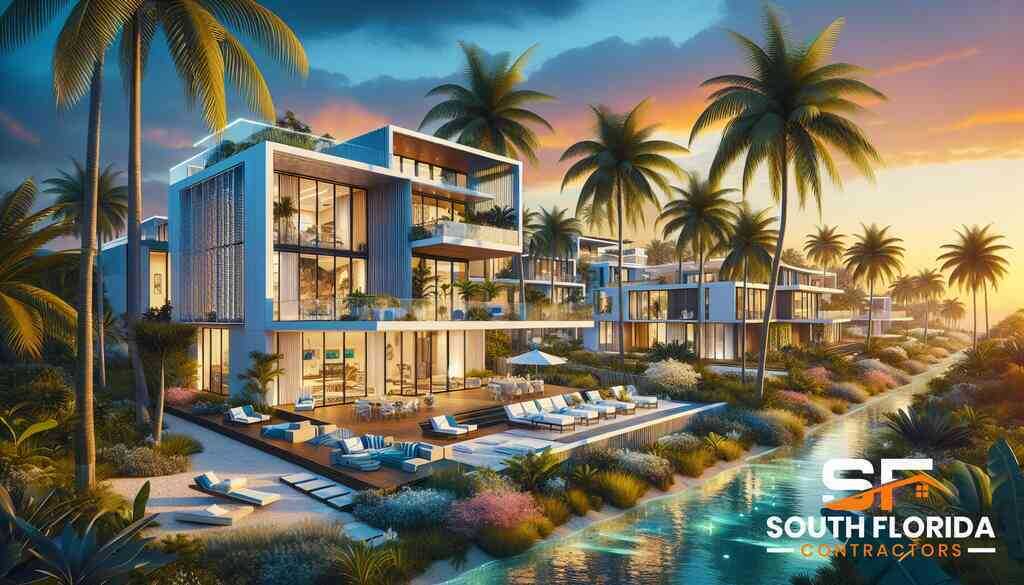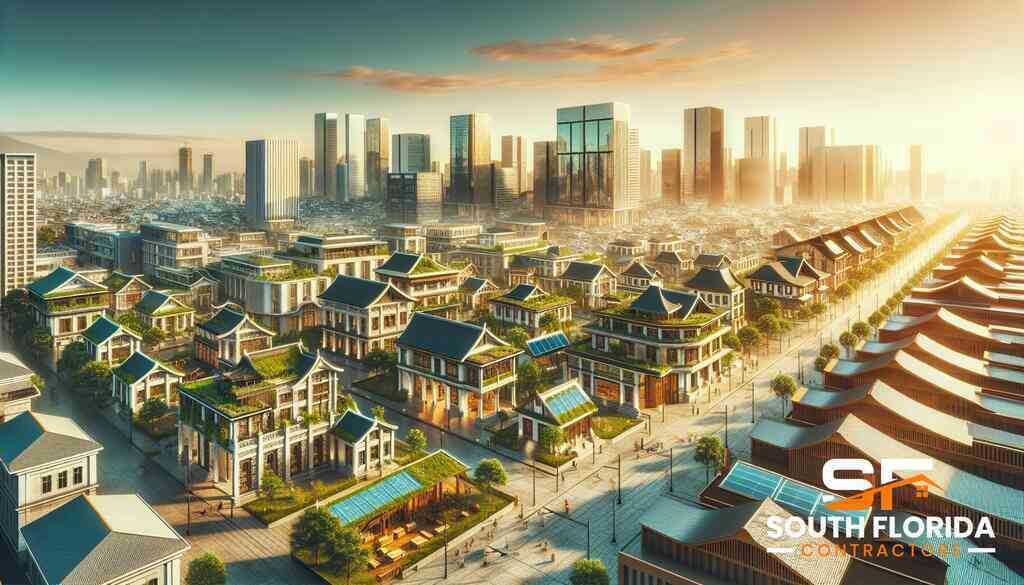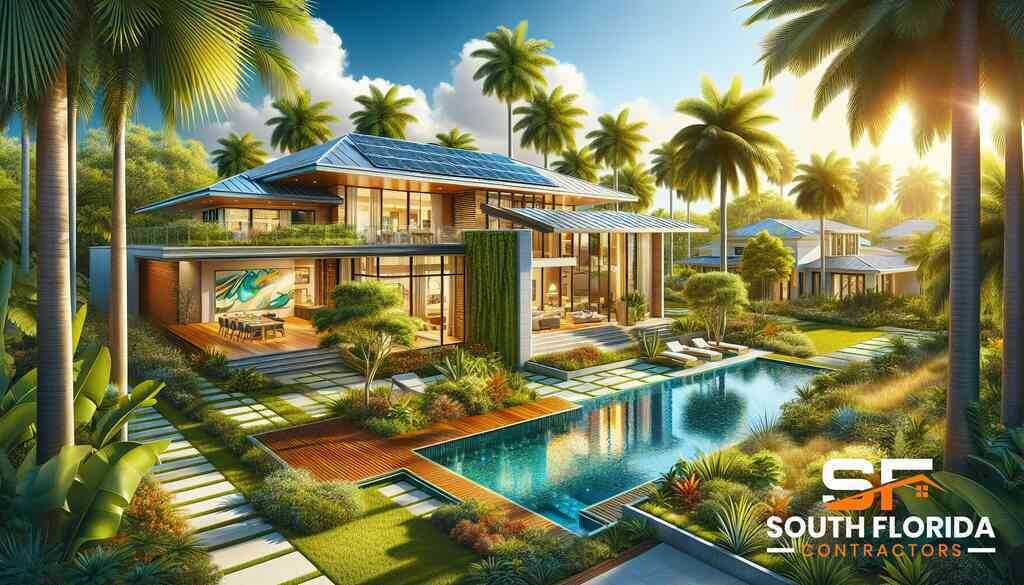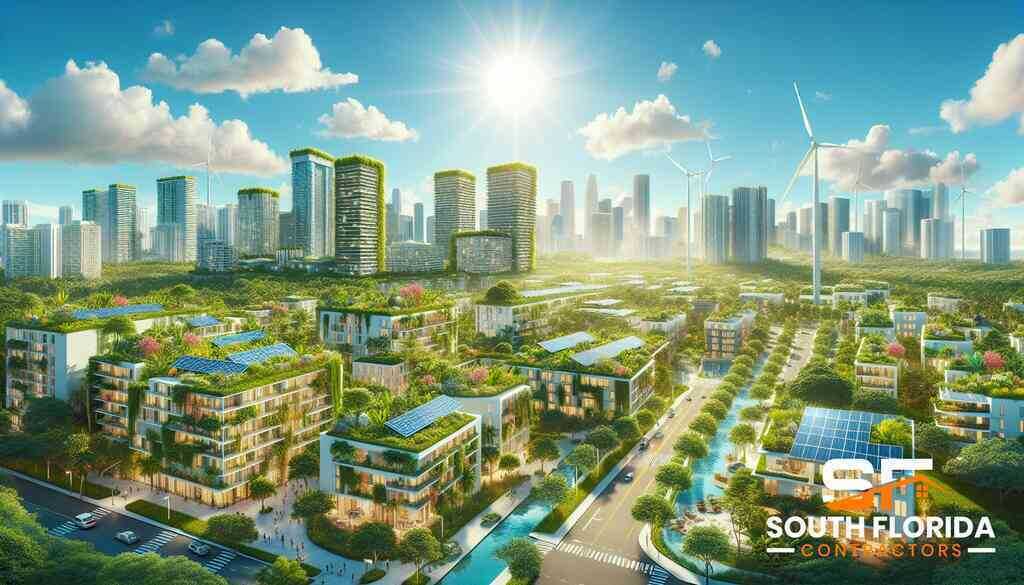
What Does Eco-Friendly Construction Mean in 2024?
September 14, 2024
Eco-Friendly Construction: The Future is Now
Understanding Eco-Friendly Construction
Eco-friendly construction, a rapidly advancing field aimed at minimizing environmental impact, signifies a shift towards sustainable building practices. As we approach 2024, this form of construction has grown beyond mere trend status, cementing itself as a fundamental approach within the industry. Central to eco-friendly construction are the principles of reducing carbon footprints, utilizing renewable resources, and creating energy-efficient structures. Unlike traditional methods that heavily rely on finite resources, the eco-conscious movement encourages the use of green building materials, such as recycled products and sustainably sourced timber, in South Florida and beyond.
The Importance of Green Buildings in 2024
The importance of green building in 2024 cannot be overstated, embracing environmental, economic, and social benefits. As climate change continues to pose significant threats, eco-friendly construction emerges as a crucial strategy in combating its effects. By prioritizing energy efficiency, renewable energy sources like solar power, and sustainable construction technologies in South Florida, green buildings contribute to a reduction in greenhouse gas emissions. Additionally, eco-friendly buildings often result in lower operational costs due to improved efficiency, proving that sustainability also offers financial incentives. This shift not only aligns with global sustainability goals but also caters to the growing consumer demand for greener living spaces.
Contrasting Traditional vs. Eco-Friendly Building Methods
The contrast between traditional and eco-friendly building methods is stark, underscoring a necessary evolution in construction practices. Conventional construction methods have typically prioritized cost and convenience over environmental impact, often resulting in significant resource depletion and environmental degradation. In contrast, eco-friendly construction focuses on long-term sustainability, incorporating renewable energy sources such as solar power construction in South Florida, water conservation techniques, and recycling services in construction near South Florida. By utilizing low-impact building methods and materials, eco-friendly construction not only lessens environmental harm but also enhances building quality and resilience, marking a paradigm shift towards a sustainable future in the construction industry.
Critical Components of Eco-Friendly Construction in South Florida
Renewable Energy Sources: Solar, Wind, and More
In South Florida, where the sun shines year-round, leveraging renewable energy sources like solar and wind represents an essential facet of eco-friendly construction. 2024 will see these technologies become more accessible than ever, making it a prime location for solar power construction. Beyond providing a sustainable power solution, these renewable sources significantly reduce reliance on fossil fuels, a common goal in South Florida’s green building initiatives. Innovative projects harnessing wind energy, though less common, are also making headway, contributing to a diversified green energy portfolio.
Green Building Materials: From Recycled to Sustainably Sourced
The evolution of green building materials has revolutionized eco-friendly construction in South Florida. Modern technologies facilitate the creation and utilization of materials that are not only sustainable but also beneficial in terms of energy efficiency and durability. This includes everything from recycled content products to sustainably harvested wood. These materials reduce the environmental impact associated with the extraction and processing of raw materials. The rise in usage of green building materials near South Florida showcases the region’s dedication to constructing environments that are harmonious with nature while promoting health and well-being.
Water Conservation Techniques in Construction
Water conservation techniques are indispensable in South Florida’s eco-friendly construction landscape, driven by the area’s unique environmental challenges, including susceptibility to droughts. Innovative approaches such as rainwater harvesting and the use of drought-resistant plants in landscaping are increasingly adopted. Innovative approaches such as rainwater harvesting and the use of drought-resistant plants in landscaping are increasingly adopted. Moreover, efficient irrigation systems and plumbing fixtures designed to minimize water use play a crucial role in sustainable construction efforts. Water conservation techniques in construction in South Florida not only aim at reducing the water footprint of new buildings but also at preserving the precious aquifers and water bodies that characterize the region.
Sustainable Landscaping in South Florida
In South Florida, sustainable landscaping goes beyond mere aesthetics by serving as a critical component of eco-friendly construction. This practice involves selecting native plants that require less water and pesticides, promoting biodiversity, and reducing maintenance needs. Sustainable landscaping also includes designing outdoor spaces in a way that maximizes energy efficiency, for instance, by strategically placing trees to provide natural cooling. By embracing sustainable landscaping practices, South Florida contractors contribute to the preservation of local ecosystems while enhancing the environmental performance and curb appeal of properties.
Advanced Energy-Efficient Building Techniques
Innovative Insulation Solutions
In the ever-evolving landscape of eco-friendly construction in 2024, innovative insulation solutions play a pivotal role. The focus on sustainability has prompted South Florida contractors to explore and adopt advanced materials and methods designed to enhance the thermal efficiency of buildings. These include the use of high-performance, eco-friendly insulation materials that not only retain temperature more effectively but also contribute to a healthier indoor environment by using substances that are safer for both residents and the environment. By minimizing energy loss, these insulation technologies help reduce the energy demand for heating and cooling, leading to significantly lower utility bills and a reduced carbon footprint for homes and commercial buildings alike.
High-Efficiency HVAC Systems and Appliances
The integration of high-efficiency HVAC systems and appliances represents another cornerstone of energy-efficient building techniques in 2024. South Florida’s subtropical climate necessitates the use of air conditioning for most of the year, making energy efficiency in HVAC systems a priority for green construction projects. The adoption of the latest HVAC technologies, characterized by their low energy consumption and high output, directly contributes to the reduction of greenhouse gas emissions. South Florida contractors now prioritize the installation of top energy-efficient AC units in South Florida, which are specifically designed to withstand the rigors of the local climate while offering substantial energy savings and improved indoor air quality.
Smart Home Technologies for Energy Management
Smart home technologies have revolutionized the way we manage energy consumption in our living and working spaces. In 2024, these technologies will become an integral part of eco-friendly construction, enabling homeowners and businesses in South Florida to monitor and control their energy use seamlessly. From smart thermostats that adjust the temperature based on occupancy and weather patterns to intelligent lighting systems that optimize natural light, these innovations are essential for reducing energy waste. Furthermore, smart home technologies offer the flexibility of remote management, allowing energy systems to be controlled via smartphones or other devices, thereby heightening efficiency and convenience.
Solar Power Construction in South Florida
Solar power construction in South Florida has seen substantial growth, driven by both environmental concerns and economic benefits. The region’s abundant sunshine makes it an ideal location for harnessing solar energy, a key element of sustainable construction methods. In 2024, solar panels are not just an add-on but a fundamental component of eco-friendly construction projects, providing a clean, renewable source of electricity that can power everything from residential homes to extensive commercial facilities. This shift towards solar power construction not only supports South Florida’s green building objectives but also offers a viable solution to reducing reliance on fossil fuels, thereby contributing to a more sustainable future.
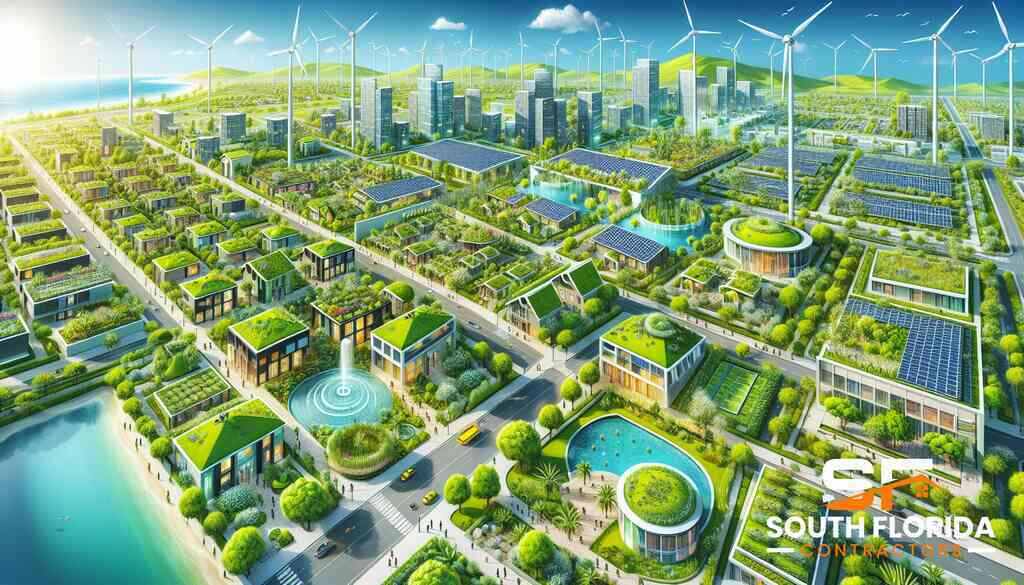
Certifications and Standards for Green Building in South Florida
LEED Certification in South Florida
The Leadership in Energy and Environmental Design (LEED) certification is a globally recognized symbol of sustainability achievement and leadership. In South Florida, securing LEED certification is becoming a priority for builders and developers dedicated to eco-friendly construction. This certification is not just a badge of honor; it’s a comprehensive framework that guides the creation of highly efficient, cost-saving green buildings. From residential projects in Boca Raton to large-scale commercial constructions in West Palm Beach, LEED certification is a testament to a project’s lower carbon footprint and commitment to environmental stewardship. Achieving this prestigious certification requires adherence to stringent criteria, including efficient use of water, energy, and other resources, as well as the reduction of waste and support for occupants’ health.
Understanding Green Building Standards in South Florida
Green building standards are an essential piece of the sustainability puzzle, offering clear guidelines to ensure construction projects minimize environmental impact. These standards cover a broad spectrum of considerations, including energy efficiency, water conservation, site selection, material use, and indoor environmental quality. In South Florida, understanding and implementing these standards is crucial due to the unique ecological challenges presented by its location. Builders and architects are increasingly turning to sustainable construction technologies in South Florida to meet these standards, which are designed not only to protect the environment but also to ensure that buildings are resilient against changing climates and extreme weather events. As South Florida faces the realities of rising sea levels and hurricanes, adherence to green building standards becomes even more critical.
Benefits of Eco-Friendly Certifications for Property Owners
For property owners in South Florida, investing in eco-friendly certifications like LEED goes beyond just the environmental benefits; it also translates to significant economic gains. Green buildings typically consume less energy and water, leading to reduced utility bills and operating costs. Moreover, properties with green certifications often enjoy higher valuation and market demand, attracting tenants and buyers willing to pay a premium for healthier, more sustainable living and working environments. Additionally, these certifications can make properties eligible for various tax rebates, financial incentives, and zoning allowances, further enhancing their appeal. Ultimately, the benefits of eco-friendly certifications extend well into the future, making them a wise investment for any South Florida property owner aiming for sustainability and profitability in an increasingly eco-conscious market.
The Role of South Florida Contractors in Promoting Sustainable Building
Finding a South Florida Contractor with a Green Vision
The pursuit of eco-friendly construction in 2024 requires partnering with contractors who not only understand but are also committed to green building practices. In South Florida, a region blessed with abundant sunlight and a community increasingly geared towards sustainability, finding a contractor with a green vision is critical to realizing eco-conscious projects. These South Florida contractors stand at the forefront of integrating sustainable construction methods, recognizing that the future of construction lies in the balance of innovation, environmental stewardship, and economic viability. These contractors need to embrace renewable energy opportunities, advocate for green building materials, and foster practices that minimize waste and pollution. Collaborating with a contractor who prioritizes sustainability not only ensures that your project aligns with contemporary environmental standards but also anticipates future trends in sustainable living.
South Florida General Contractor’s Approach to Eco-Conscious Construction Services
General contractors in South Florida are increasingly adopting an eco-conscious approach to construction services, recognizing the significant impact that building design and materials have on the environment. This approach encompasses a broad spectrum of practices, from selecting sustainable building materials to employing energy-efficient construction technologies. A focus on sustainable construction technologies in South Florida ensures that projects not only meet current demands for environmental responsibility but also promote longer-term sustainability. These contractors view each project as an opportunity to contribute positively to the built environment, emphasizing the importance of resource efficiency, waste reduction, and the health and well-being of occupants. By doing so, they are able to deliver projects that are both environmentally responsible and economically advantageous for clients and the community at large.
Incorporating Sustainable Construction Technologies
The incorporation of sustainable construction technologies has become a hallmark of modern eco-friendly building practices. In South Florida, contractors are leveraging these technologies to address the region’s unique environmental challenges, such as high humidity, frequent storms, and the need for effective cooling solutions. Techniques like passive solar design, green roofing, and the use of advanced insulation materials are becoming standard practices. Furthermore, the implementation of solar power construction in South Florida is not just a trend but a necessity, given the region’s ideal conditions for solar energy generation. Innovations in construction technologies facilitate the creation of buildings that not only consume less energy but also enhance resilience to climate change. By incorporating these technologies, South Florida contractors are setting new standards for sustainability, demonstrating that eco-friendly construction is not only viable but preferable in today’s building industry.
Practical Examples of Eco-Friendly Projects in South Florida
Case Studies: Green Residential Projects in Florida
Embracing Solar Power and Green Materials
The journey towards eco-friendly construction in South Florida is vividly illustrated through various green residential projects. One notable example is a Boca Raton housing development where homes are powered entirely by solar energy. This initiative has set a new standard for sustainable living in the region. By integrating green building materials near South Florida, these homes not only excel in energy efficiency but also in reducing the overall carbon footprint, showcasing the practicality and effectiveness of renewable energy in residential construction.
Water Conservation and Sustainable Landscaping Practices
Another exemplary project involves a community in Delray Beach that focuses on water conservation techniques. The use of drought-resistant landscaping and rainwater harvesting systems has significantly reduced water usage, serving as a model for sustainable residential development. These initiatives demonstrate how eco-friendly construction methods can be effectively applied to address South Florida’s specific environmental challenges, like water scarcity and stormwater management.
Eco-Friendly Commercial Construction Success Stories
LEED-Certified Buildings Transforming the Skyline
The incorporation of LEED-certified commercial buildings has progressively transformed the skyline of South Florida. These structures not only contribute to a healthier environment but also to the economic viability of sustainable construction. A prime example is a commercial complex in West Palm Beach that achieved LEED Platinum status through its innovative design, which includes energy-efficient systems and materials. This success story of eco-friendly commercial construction in South Florida highlights the financial and environmental benefits of green building practices in the commercial sector.
Advancements in Energy Efficiency and Sustainability
Thanks to advancements in building technology and design, commercial projects in South Florida have also made significant strides in energy efficiency. For instance, a retail center in Boynton Beach was constructed using high-performance insulation and HVAC systems, leading to a drastic reduction in energy consumption. This project underscores the importance of energy-efficient building design on Florida’s path toward sustainable commercial development.
Innovations in Sustainable Urban Development South Florida
The Integration of Eco-Friendly Public Spaces
Innovation in sustainable urban development is another area where South Florida shines. The development of green public spaces, such as parks and recreational areas in Miami, has provided communities with environmentally friendly places for relaxation and socialization. These spaces are often powered by renewable energy sources and incorporate sustainable landscaping practices, highlighting the region’s dedication to enhancing urban living through sustainability.
Sustainable Transportation and Infrastructure
The rise of sustainable transportation solutions and infrastructure in South Florida illustrates the broader commitment to eco-friendly urban development. Projects focusing on enhancing pedestrian pathways, cycling lanes, and the use of electric public transport are pivotal in reducing the urban carbon footprint. Such initiatives showcase the potential of sustainable urban development in South Florida, paving the way for a greener, more sustainable future.
These practical examples demonstrate South Florida’s leadership in eco-friendly construction and sustainable urban development. By showcasing successful projects in residential, commercial, and public sectors, the region sets a benchmark for sustainability that others can aspire to follow.
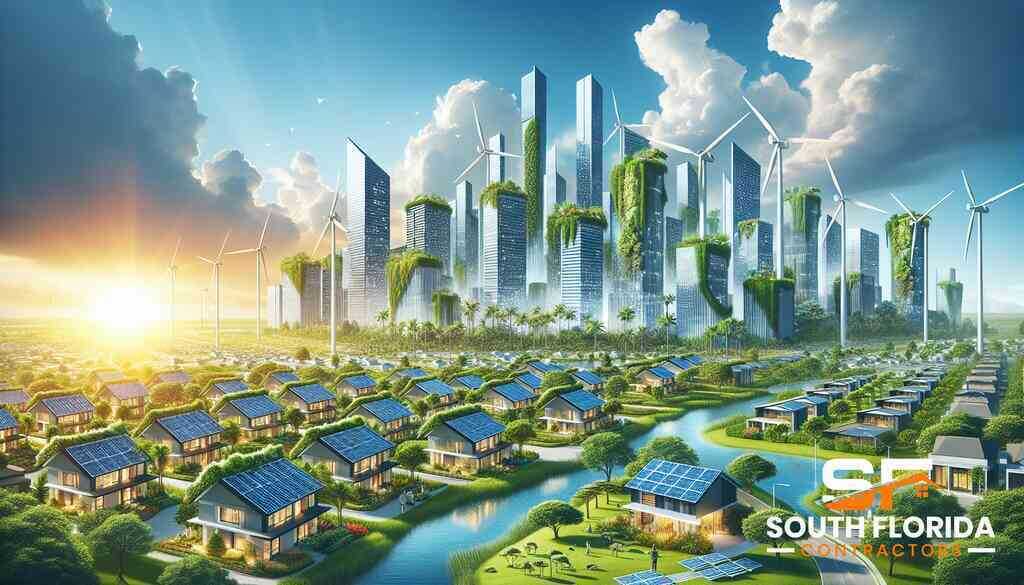
Embracing a Sustainable Future: How to Get Started with Your Green Project
The path toward sustainable construction is a journey of commitment, innovation, and partnership. As we focus on what eco-friendly construction means in 2024, it’s vital to understand the steps to initiate your green project. Whether it’s a commercial venture or a personal home build in South Florida, the foundation of any eco-conscious construction project begins with the right team, thoughtful planning, and a commitment to ongoing education and adaptation to new sustainable practices.
Steps to Find an Eco-Conscious South Florida Contractor
Finding a South Florida contractor with a green vision is the first critical step in realizing your eco-friendly construction project. Start by exploring directories like South Florida Contractors to identify professionals who specialize in green building. Look for contractors with certifications in sustainable construction practices, such as LEED accreditation or experience with Energy Star-rated projects. It’s also beneficial to review past projects and ask for references to gauge their expertise in implementing eco-conscious construction services.
When communicating with potential contractors, be clear about your sustainability goals. Discuss options for recycling services in construction near South Florida, utilizing renewable energy sources, and employing green building materials. A contractor who is genuinely committed to sustainability will be eager to collaborate on innovative solutions and suggest additional eco-friendly practices.
Planning Your Eco-Friendly Construction Project
Planning is paramount in eco-friendly construction. This phase involves more than just selecting the suitable materials; it’s about designing with energy efficiency and sustainability at the forefront. Consider an energy-efficient building design on Florida’s climate, focusing on passive solar heating, natural cooling, and green roofing solutions to reduce energy consumption. It’s also crucial to incorporate sustainable landscaping designs that complement your building’s energy-saving features and contribute to local biodiversity.
From the outset, incorporating technologies such as smart home systems for energy management and solar power construction in South Florida can substantially increase the building’s efficiency. Planning should also account for water conservation, utilizing rainwater harvesting and efficient irrigation systems. Engaging with architects and engineers who are knowledgeable in green building standards will ensure that your project meets environmental certifications and provides the anticipated long-term sustainability benefits.
The Importance of Continuous Learning and Adaptation in Green Building
The field of eco-friendly construction is rapidly evolving, with new materials, technologies, and standards developing continuously. Staying informed about the latest in sustainable construction methods and materials is vital for anyone involved in eco-friendly projects. Encourage your project team to engage in ongoing education about sustainable practices and innovations.
As construction progresses and even after the project’s completion, evaluate the building’s performance against your sustainability goals. Be open to retrofitting or adopting new technologies as they become available to enhance energy efficiency, water conservation, or indoor air quality. Networking with other green building professionals and participating in sustainability forums can also provide valuable insights and inspiration for future projects.
By taking a comprehensive and informed approach to eco-friendly construction, you can ensure that your project not only contributes positively to South Florida’s built environment but also sets a precedent for sustainable development well into the future and beyond 2024.
Frequently Asked Questions
Question: What are the key elements that define eco-friendly construction in 2024, according to South Florida Contractors?
Answer: Eco-friendly construction in 2024, as defined by South Florida Contractors, encompasses sustainable building practices aimed at minimizing environmental impact and promoting the health and well-being of occupants. This includes the use of green building materials, energy-efficient building techniques, renewable energy sources in construction, such as solar power, and applying sustainable construction methods. South Florida Contractors is committed to integrating these elements into projects, demonstrating a solid dedication to environmentally friendly construction and the promotion of green residential projects in Florida.
Question: How do South Florida Contractors ensure that their projects achieve LEED certification in South Florida?
Answer: South Florida Contractors prioritizes the achievement of LEED certification for projects by adhering to rigorous standards that emphasize water and energy efficiency, sustainable site development, material selection, and indoor environmental quality. As a leading South Florida general contractor, the company utilizes advanced sustainable construction technologies and eco-conscious construction services to meet and exceed the stringent criteria set by the LEED certification process. By fostering partnerships with expert architects, engineers, and builders who share a commitment to sustainability, South Florida Contractors ensures that each project not only targets LEED certification but also sets a benchmark for green building in the region.
Question: Can South Florida Contractors provide examples of how eco-friendly insulation solutions and green roofing options are incorporated into their projects?
Answer: South Florida Contractors incorporates eco-friendly insulation solutions and green roofing options through the use of sustainable and high-performance materials that enhance a building’s energy efficiency and environmental impact. For insulation, the company selects materials with superior thermal properties that also contribute to healthier indoor air quality, such as soy-based foam or recycled denim. When it comes to roofing, South Florida Contractors opt for reflective or green-planted roofs that reduce heat absorption, thereby decreasing the need for cooling energy. By focusing on solutions that offer both insulation and sustainability benefits, South Florida Contractors promotes low-impact construction methods and energy-saving building design in South Florida’s unique climate.
Question: In the context of “What Does Eco-Friendly Construction Mean in 2024?” How do South Florida Contractors integrate smart home technologies for energy management in South Florida?
Answer: In the context of “What Does Eco-Friendly Construction Mean in 2024?”, South Florida Contractors integrates smart home technologies as a crucial component of energy management in South Florida homes and buildings. The company embraces systems like programmable thermostats, bright lighting, and energy monitors that optimize energy use based on real-time data and user patterns. These technologies allow for automated adjustments that can significantly reduce energy consumption without sacrificing comfort, aligning with 2024’s push toward sustainable living. South Florida Contractors’ commitment to these advanced technologies ensures that their projects embody the principles of eco-friendly construction by enhancing efficiency and reducing the carbon footprint.
Question: What role does sustainable landscaping play in South Florida Contractors’ eco-friendly construction projects?
Answer: Sustainable landscaping plays a vital role in South Florida Contractors’ approach to eco-friendly construction. Understanding the importance of harmony with the local ecosystem, the company incorporates native plants that require less water and fewer chemicals, reducing environmental impact. Sustainable landscaping practices also include designing outdoor spaces to maximize natural lighting and shade, further contributing to energy efficiency. By incorporating these green practices, South Florida Contractors not only enhances the visual appeal and value of properties but also contributes to the conservation of local biodiversity and the promotion of sustainable urban development in South Florida.
